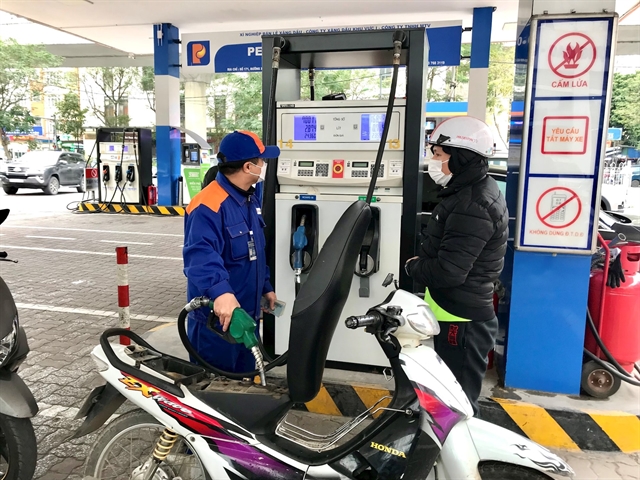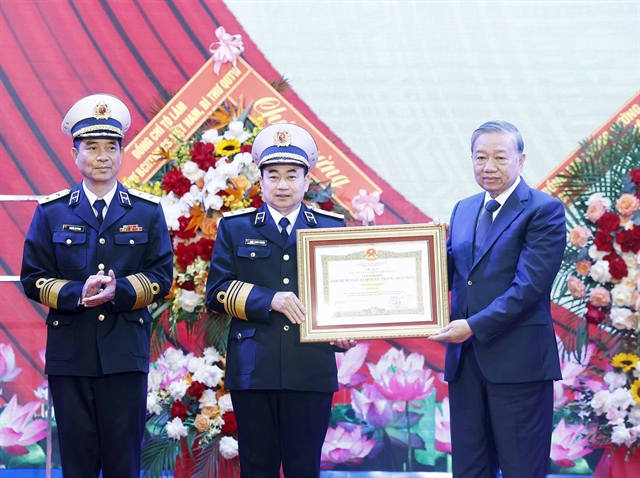 Economy
Economy

 |
| Products of Johnnie Walker, the world's best selling Scotch Whisky, displayed on a shell of a supermarket in Hà Nội. — VNS Photo Ly Ly Cao |
HÀ NỘI — More than two years after the United Kingdom-Việt Nam Free Trade Agreement (UKVFTA) took effect, Vietnamese and UK companies have started to seize opportunities from it.
Bilateral trade between Việt Nam and the UK is one of the bright spots, with total two-way import-export transaction reaching US$5.87 billion in the first ten months of 2023, up 1.6 per cent year-on-year.
During the period, many key export items of Việt Nam have shown significant growth, including rubber products (66 per cent), electrical wires and cables (55.5 per cent), various types of phones and components (21 per cent), machinery and equipment (15.5 per cent), and agricultural products such as fruits and vegetables (15.5 per cent), cashew nuts (7.2 per cent) and coffee (5.7 per cent).
However, that also comes with issues. The demand for using trade defence tools and the number of trade defence cases from both sides have increased as UKVFTA involves steep tariff reductions, leading to high competition among businesses.
Vietnamese enterprises, therefore, must comprehend and grasp the commitments in the agreement to prepare for and exploit the benefits of the FTA while also protecting their legitimate interests.
Currently, Việt Nam has a legal framework on trade defence that is in line with the World Trade Organisation (WTO) standards and international practices, allowing it to launch investigations and apply trade defence measures to protect its interests when implementing the agreement.
The provisions on trade defence in the UKVFTA are negotiated based on the principles inherited from the commitments made in the EU-Việt Nam FTA (EVFTA), with necessary adjustments to ensure compatibility within the bilateral trade framework between the two parties. The content regarding trade defence in both agreements is similar.
To support Vietnamese businesses in utilising the benefits of the UKVFTA and proactively protecting domestic production during the implementation of the agreement, the Ministry of Industry and Trade (MoIT) is undertaking the process of domesticating the provisions of the UKVFTA, including providing detailed guidance on rules of origin and trade defence.
On October 29, 2021, the MoIT issued Circular No. 14/2021/TT-BCT guiding the implementation of the FTA between Việt Nam and the UK, effective December 15, 2021.
The circular outlines three principles for applying bilateral safeguard measures under the UKVFTA.
Specifically, it is not permissible to simultaneously apply bilateral safeguard measures and safeguard measures under Article XIX of the 1994 General Agreement on Tariffs and Trade (GATT) to the same imported goods benefiting from preferential tariffs under the UKVFTA.
In addition, bilateral safeguard measures are not applicable beyond the transitional period unless there is an agreement with the UK.
Meanwhile, the investigation and application of bilateral safeguard measures on imported goods originating from the UK must adhere to the provisions of this circular and the relevant trade defence laws of Việt Nam.
 |
| Workers packaging rice for export at a plant of Lộc Trời Group. — VNA/VNS Photo |
Under Circular 14, the Minister of Industry and Trade has made a decision regarding the application of bilateral safeguard measures based on findings of the investigating authority, such as that there is a significant absolute or relative increase in the importation of goods enjoying preferential tariffs under the UKVFTA compared to the volume of similar goods and commodities that directly compete with local products. Or the domestic manufacturing sector is experiencing or facing severe damage. Or the increase in imported goods is causing or posing a serious threat to the domestic manufacturing industry.
After the analysis, evidence and conclusion that imports from the UK market are causing severe damage to the domestic manufacturing sector, some bilateral safeguard measures will be implemented.
They include suspension of any further reduction in the import duty rates as prescribed by the UKVFTA agreement or the imposition of higher import duty rates on those specific goods.
The investigation period for implementing bilateral safeguard measures is one year from the date of issuing the investigation decision, according to Circular 14, while the duration of bilateral safeguard measures should not exceed two years.
However, if the investigating body concludes that it is necessary to continue applying bilateral safeguard measures to prevent or address serious harm and facilitate the adjustment of the domestic manufacturing industry, the application period can be extended for a maximum of two more years.
In cases where the application period of bilateral safeguard measures goes beyond two years, the measures must gradually be eased in intensity throughout their implementation.
After the application period for bilateral safeguard measures expires, the applicable import tariffs for the relevant goods will be determined according to the provisions of the UKVFTA that are in effect at that time.
The investigating body will provide written notification to the UK regarding the investigation and application of bilateral safeguard measures and conduct consultations with them in accordance with the provisions specified in the UKVFTA.
The UKVFTA was signed by Việt Nam and the UK on December 29, 2020. To maximise the convenience of trade activities between the two parties, the agreement took temporary effect at 6:00am on January 1, 2021 (local time) and officially took effect on May 1, 2021.
The FTA is considered comprehensive, high-quality and balanced in benefits for all parties. — VNS




